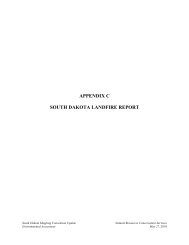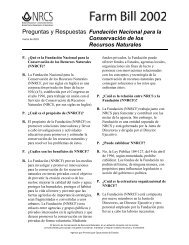Pilot Project for Value-Added Product Development from Solid ...
Pilot Project for Value-Added Product Development from Solid ...
Pilot Project for Value-Added Product Development from Solid ...
You also want an ePaper? Increase the reach of your titles
YUMPU automatically turns print PDFs into web optimized ePapers that Google loves.
While the full-scale vermicomposting facility was being designed and built a small-scale<br />
experiment was established at North Carolina State University’s Lake Wheeler Road Field<br />
Laboratory to collect preliminary data on vermicompost physical and chemical properties<br />
and the potential <strong>for</strong> pathogen reduction in the finished material. During a 12-month<br />
period, over 5,200 pounds of separated swine solids were added to a worm bin at a rate of<br />
approximately 0.3 pounds per square foot of bed surface area. Approximately 1,560<br />
pounds of castings were collected <strong>from</strong> the small-scale bed. The recovered castings<br />
contained approximately 42% of the nitrogen and 82% of the phosphorus that was present<br />
in the waste material originally applied. The vermicomposting of the small-scale bed also<br />
provided a 3-log reduction in the number of bacterial indicators <strong>for</strong> which analysis was<br />
conducted, including fecal coli<strong>for</strong>m, E. coli, and enterocci. Because the criteria <strong>for</strong> the<br />
EST determination requires a 4-log reduction 8 , an additional treatment will likely be<br />
required to meet the EST requirement as well as the new per<strong>for</strong>mance standards.<br />
NatureWorks Organics already adds a drying step at its centralized process facility that<br />
may provide additional treatment. The potential <strong>for</strong> additional treatment benefits will be<br />
verified during the full-scale evaluation that will occur once worm castings become<br />
available <strong>for</strong> analysis by North Carolina State University.<br />
Funding<br />
Of the grant funding, $83,700 was used to design and construct the on-farm<br />
vermicomposting system. In addition, NatureWorks Organics contributed $190,000<br />
toward the project, including project management costs, the purchase of worms, and<br />
$52,000 in funding provided to North Carolina State University <strong>for</strong> the environmental<br />
per<strong>for</strong>mance verification of the system.<br />
8 This requirement specifically applies to the terms of the Smithfield Agreement.<br />
9
















